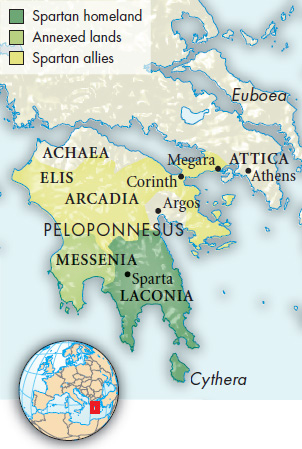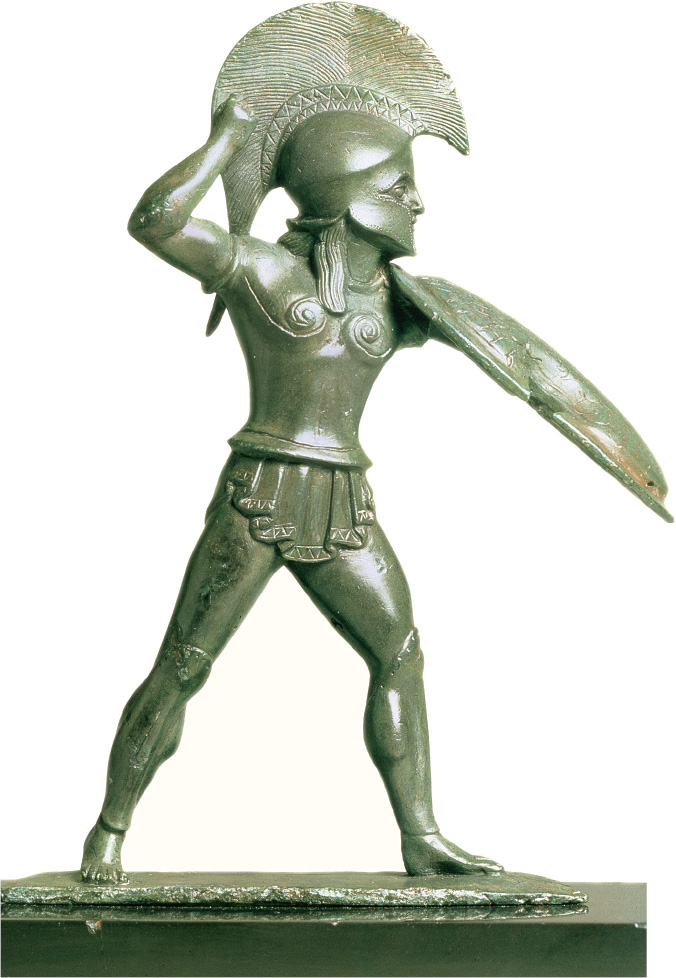A History of Western Society: Printed Page 70
A History of Western Society, Value Edition: Printed Page 72
The Growth of Sparta

Many different poleis developed during the Archaic period, but Sparta became the leading military power in Greece. To expand their polis, the Spartans did not establish colonies but set out in about 750 B.C.E. to conquer Messenia (muh-SEE-nee-uh), a rich, fertile region in the southwestern Peloponnesus. This conflict, called the First Messenian War by later Greek historians, lasted for twenty years and ended in a Spartan triumph. The Spartans appropriated Messenian land and turned the Messenians into helots (HEH-luhts), unfree residents forced to work state lands. Residents of coastal areas and the hills surrounding Messenia became a third group, known as periokoi (pehr-ee-OI-koi), who were free but had no political voice in the running of Sparta.
In about 650 B.C.E. Spartan exploitation and oppression of the Messenian helots, along with Sparta’s defeat at the hands of a rival polis, led to a massive helot revolt that became known as the Second Messenian War. The Spartan poet Tyrtaeus, a contemporary of these events, vividly portrays the violence of the war:
For it is a shameful thing indeed
When with the foremost fighters
An elder falling in front of the young men
Lies outstretched,
Having white hair and grey beard,
Breathing forth his stout soul in the dust,
Holding in his hands his genitals
stained with blood.2
Finally, after some thirty years of fighting, the Spartans put down the revolt. Nevertheless, the political and social strain it caused led to a transformation of the Spartan polis. After the war, non-nobles who had shared in the fighting as hoplites appear to have demanded rights equal to those of the nobility and a voice in the government. (In more recent history, similar demands in the United States during the Vietnam War led to a lowering of the voting age to eighteen, to match the age at which soldiers were drafted.) Under intense pressure the aristocrats agreed to remodel the state into a new system.
The plan for the new system in Sparta was attributed to the lawgiver Lycurgus, who may or may not have been an actual person. According to later Greek sources, political distinctions among Spartan men were eliminated, and all citizens became legally equal. Governance of the polis was in the hands of two hereditary kings who were primarily military leaders. The kings were also part of the Gerousia (jeh-roo-SEE-ah), a council of men who had reached the age of sixty and thus retired from the Spartan army. The Gerousia deliberated on foreign and domestic matters and prepared legislation for the assembly, which consisted of all Spartan citizens. The real executive power of the polis was in the hands of five ephors (EH-fuhrs), or overseers, elected from and by all the citizens.
To provide for their economic needs, the Spartans divided the land of Messenia among all citizens. Helots worked the land, raised the crops, provided the Spartans with a certain percentage of their harvest, and occasionally served in the army. The Spartans kept the helots in line by means of systematic brutality and oppression.

In the system attributed to Lycurgus every citizen owed primary allegiance to Sparta. Suppression of the individual together with emphasis on military prowess led to a barracks state. Family life itself was sacrificed to the polis. Once Spartan boys reached the age of seven, they were enrolled in separate companies with other boys their age. They were required to live in the barracks and eat together in a common mess hall until age thirty. They slept outside on reed mats and underwent rugged physical and military training until they were ready to become frontline soldiers. For the rest of their lives, Spartan men kept themselves prepared for combat. Their military training never ceased, and the older men were expected to be models of endurance, frugality, and sturdiness. In battle Spartans were supposed to stand and die rather than retreat. Because men often did not see their wives or other women for long periods, not only in times of war but also in peace, their most meaningful relations were same-sex ones. The Spartan military leaders may have viewed such relationships as militarily advantageous because they believed that men would fight even more fiercely for lovers and comrades.
Spartans expected women in citizen families to be good wives and strict mothers of future soldiers. They were prohibited from wearing jewelry or ornate clothes. They, too, were supposed to exercise strenuously in the belief that hard physical training promoted the birth of healthy children. Xenophon (ca. 430–354 B.C.E.), a later Athenian admirer of the Spartans, commented: “[Lycurgus had] insisted on the training of the body as incumbent no less on the female than the male; and in pursuit of the same idea instituted rival contests in running and feats of strength for women as for men. His belief was that where both parents were strong their progeny would be found to be more vigorous.”3
An anecdote frequently repeated about one Spartan mother sums up Spartan military values. As her son was setting off to battle, the mother handed him his shield and advised him to come back either victorious, carrying the shield, or dead, being carried on it. Yet Spartan women were freer than many other Greek women. With men in military service much of their lives, women in citizen families owned land and ran the estates and were not physically restricted or secluded.
Along with the emphasis on military values for both sexes, the Spartan system served to instill in society the civic virtues of dedication to the state and a code of moral conduct. These aspects of Spartan society, along with Spartan military successes, were generally admired throughout the Greek world.